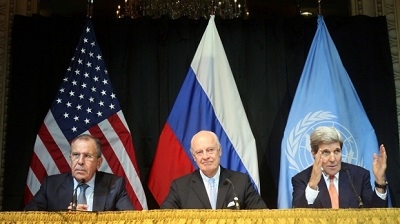Major international and regional powers, including representatives from 19 countries, concluded their meeting in Vienna Saturday agreeing to a set of principles for a solution to the crisis in Syria.
The principles included a plan to work toward a lasting cease fire and a comprehensive truce between all parties, the survival of Syria’s state institutions and the formation of a representative government.
The fate of Syrian President Bashar al-Assad and his role in the transitional phase remained an issue of dispute, but the representatives agreed to hold another meeting in the Austrian capital in two weeks’ time.
Meanwhile, dozens of civilians were killed and injured in Syrian and Russian raids on the east of Damascus and Aleppo, while US President Barack Obama's administration agreed to send around 50 special operations forces to Syria to support Arab and Kurdish guerrillas fighting against the Islamic State (ISIS) in northeastern Syria.
The issuance of a joint statement from the Vienna meeting was considered a positive development, as it called for the formation of a transitional body with full executive powers. The Vienna statement urged for a truce in all parts of Syria, adding that major differences still remain despite participants agreeing on the need to “accelerate all diplomatic efforts to end the war.”
It also called on the United Nations to bring together representatives of the Syrian government and the opposition, in order to launch a “political process leading to credible, inclusive, non-sectarian governance, followed by a new constitution and elections.”
US Secretary of State John Kerry stressed at a press conference with his Russian counterpart, Sergei Lavrov, the importance of some of the agreed upon principles, including the preservation of Syrian state institutions and the unity of Syria.
Kerry also alluded to differences between the US on the one hand and Russia and Iran on the other regarding President Assad's future, though all parties involved in the Vienna meeting agreed to work for a political solution to end the conflict. Kerry said the US, Russian and Iran – the main parties involved in the diplomatic efforts to resolve the conflict – "agreed not to agree" about the fate of Assad.
Lavrov, for his part, said the talks failed to reach an agreement on the fate of Assad, adding "the fate of the president of Syria must be decided by the Syrian people," pointing out that the discussion related to a cease fire in Syria should continue, but stressed the importance of continuing the fight against terrorist groups.
Saudi Foreign Minister Adel al-Jubeir said in an interview with BBC that Riyadh adheres to its view that Assad must step down urgently, adding that the Syrian president will leave either through a political process or by force.
This article was translated and edited by The Syrian Observer. Responsibility for the information and views set out in this article lies entirely with the author.


